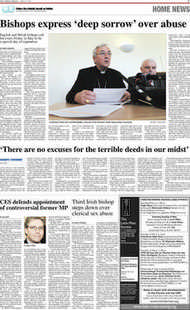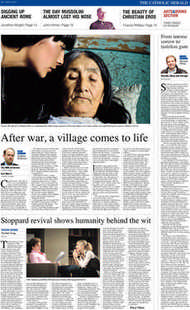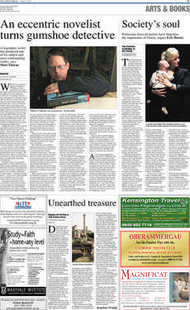Page 13, 30th April 2010
Page 13

Report an error
Noticed an error on this page?If you've noticed an error in this article please click here to report it.
Tags
Share
Related articles
You Don’t Have To Be A Newman Scholar To Write About His...
‘hitler’s Pope’ Author Criticises Pope’s View Of Newman
It Is Wrong To Invoke An Imaginary ‘spirit Of John Henry...
Newman Scholar Rejects Claim That Cardinal Was Gay
At Vatican Ii, The Church Jumped Away From 19th-century...
Debating Newman
From Fr Ian Ker SIR – John Cornwell (letters, April 23) is upset that I, “a fellow Catholic writer”, should have described his “critical” article in the Easter New Statesman about Pope Benedict XVI (“a fellow Catholic writer”, incidentally) as a “vicious and virulent attack”. Let me quote one sentence to give readers the flavour of that article: “It is common knowledge that, as Cardinal Ratzinger, he discouraged bishops from dealing expeditiously with abusers locally.” Mr Cornwell tells us that he has spent his life studying Newman. In that case, it is odd that in that article, where he uses Newman as a stick to beat the Pope with, he should have trotted out those two hoary howlers about conscience and development. Presumably Mr Cornwell has read the two relevant texts, two of the most famous texts in Newman. Confronted by these texts, Mr Cornwell resorts to saying that I well know that “Newman’s mode of ‘saying and unsaying’ allows one to make all manner of conflicting claims about Newman’s viewpoints”. Really? I certainly know the theological paper where Newman writes that we have to talk about God “by saying and unsaying” because we have to say one thing and then another contradictory thing, such as that He is “omnipresent and yet nowhere”.
But Newman is talking about how we have to talk uniquely about God and not how we talk about things like conscience and development. Presumably, however, Mr Cornwell means that what Newman writes about conscience and development in the texts I quoted he then unsays in other texts (which apparently Mr Cornwell is unable at present to lay his hands on). In fact, Newman, who made “consistency the mark of a Saint”, “did not say and unsay”, if I may quote words that he wrote about Our Lord.
I did not bother to cite chapter and verse to refute Mr Cornwell’s third allegation that Newman believed that “formation for the priesthood should be done on the job” and not in seminaries. But since he tells us that he has read all 32 volumes of letters and diaries, let me refresh his memory of a letter to Matthew Arnold, for example, where Newman says that the “the present strict Seminary system” has to be “narrow, if it is to be effective for the purposes of [the clerical] profession” (vol 28, p5).
I cannot think why Mr Cornwell should presume it enough to describe aspects of St Jean Marie Vianney’s ascetic life to prove that Newman would not have found him “a commendable model of priesthood”. Had Mr Cornwell experienced life at Littlemore, as Blessed Dominic Barberi did, who said that compared with it a Capuchin monastery was like “a great palace”, I cannot suppose that he would commend Newman either as “a model of priesthood”.
Yours faithfully, IAN KER By email From Mr John Wilkins SIR – I fear that, unlike Fr Ker (Comment, April 20), I cannot claim to have written or edited more than 20 books on John Henry Newman – I have not even produced a single one. But I have it in common with Fr Ker that Newman has been a light in my life – though a light that can act like a laser, because of those piercing psychological arrows that he shoots off in his sermons and writings.
Also like Fr Ker, I used to be an Anglican. But if I felt that his account of Newman’s view of conscience was complete, I might never have entered the Roman Catholic Church, since this was a real issue for me at the time.
Brought up by Nonconformist parents, I could not accept an understanding of conscience that presented it as operating up to a certain point after which the Church’s Magisterium or teaching authority clicked in and the voice of conscience fell mute. Newman helped me, as he has helped countless others, to see this was not the case.
Just before the famous reference to after-dinner toasts, he affirms the traditional teaching that “in no manner is it lawful to act against conscience even though a law or a superior commands it” and this, he adds, “certainly includes the pope” (Letter to the Duke of Norfolk, 5). If conscience simply meant obeying the Magisterium, there would be no call for two toasts – “to conscience first and to the pope afterwards” – one would suffice. The crisis through which the Catholic Church is passing calls out for this distinction to be maintained.
Of course Fr Ker is right to emphasise the duty to inform one’s conscience. But unless one admits that there is more to it than that, then, as John Cornwell argued in the New Statesman, the challenge of Newman’s view on the subject is tidied up and flattened out.
Yours faithfully, JOHN WILKINS London SW1
blog comments powered by Disqus





















